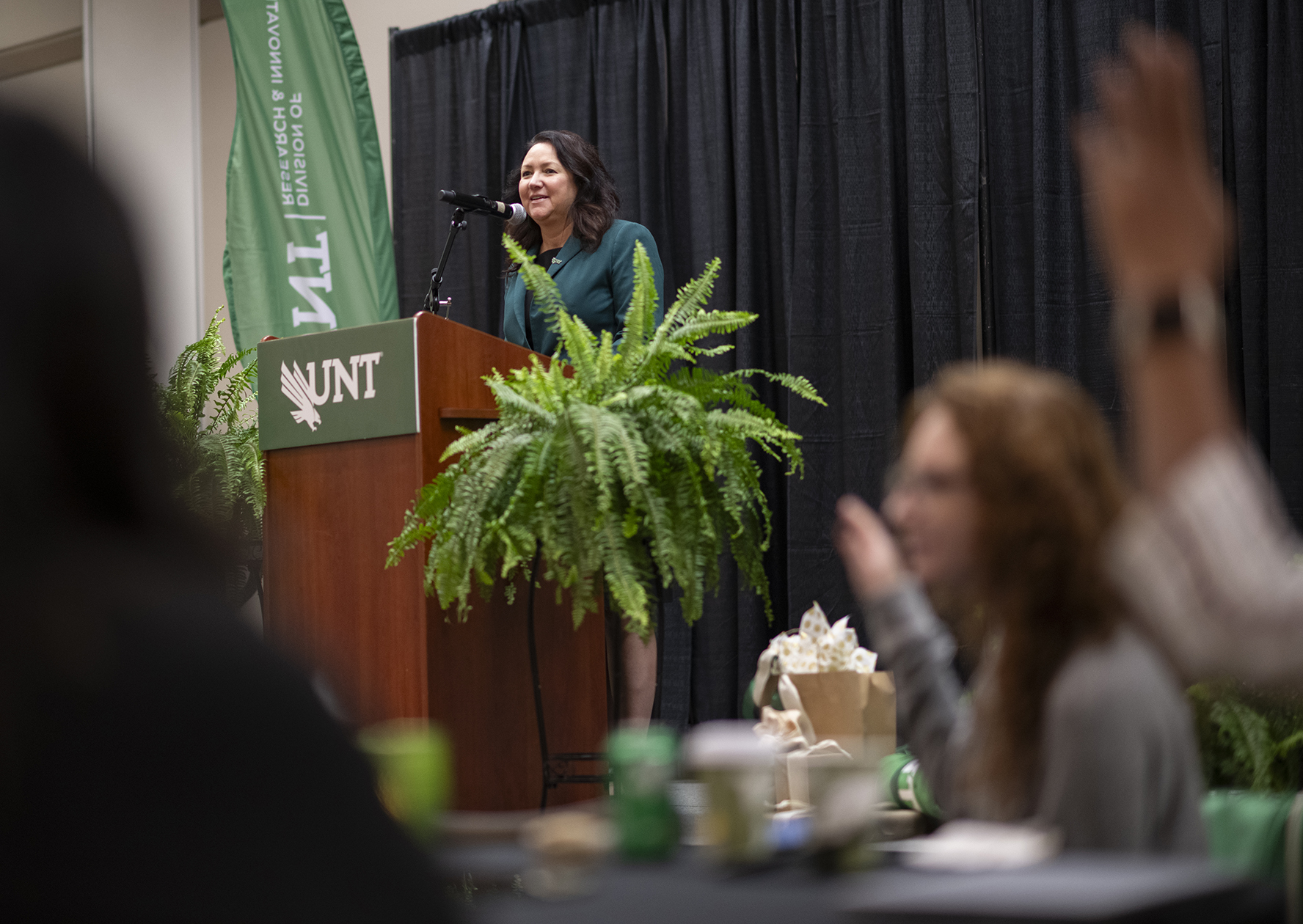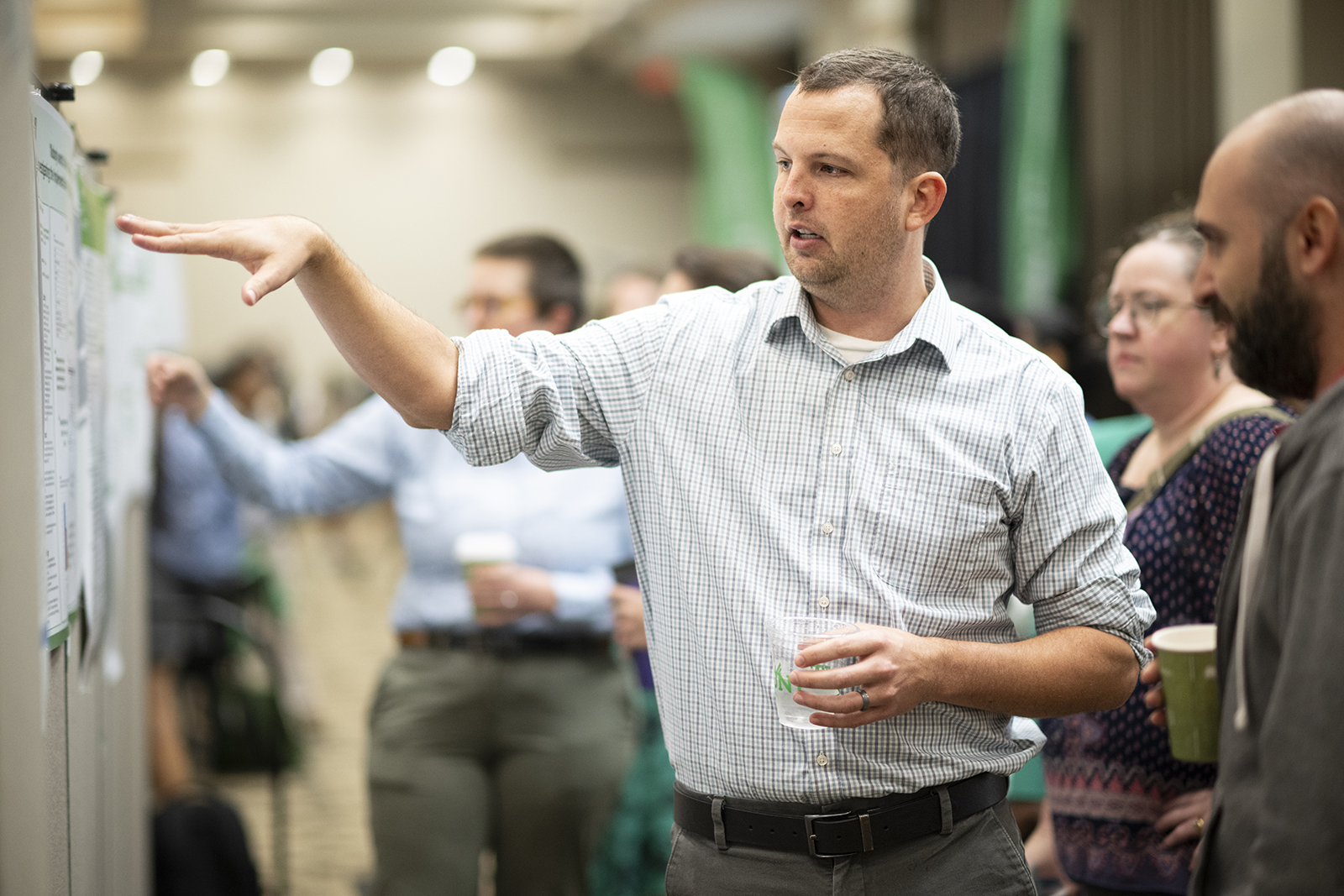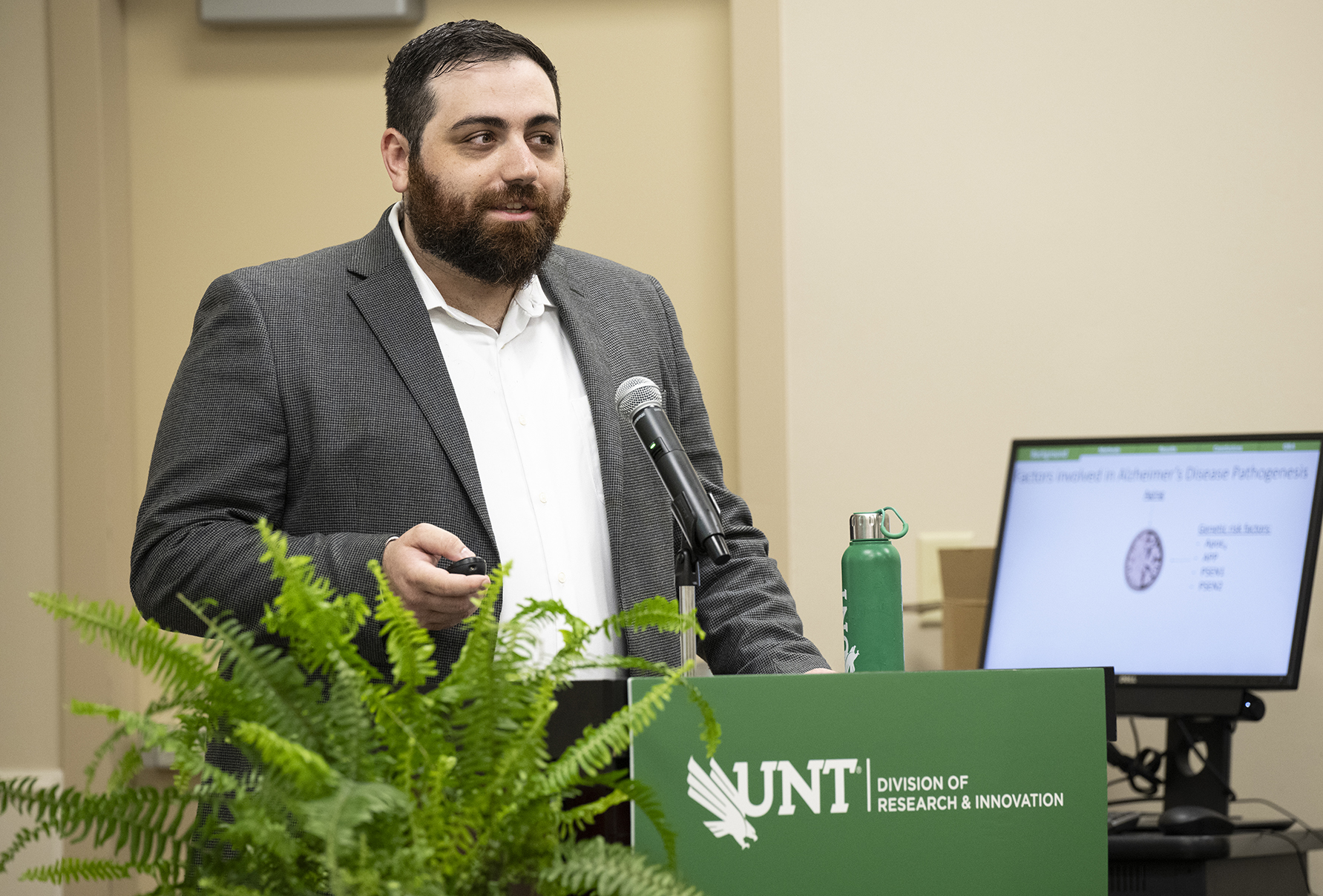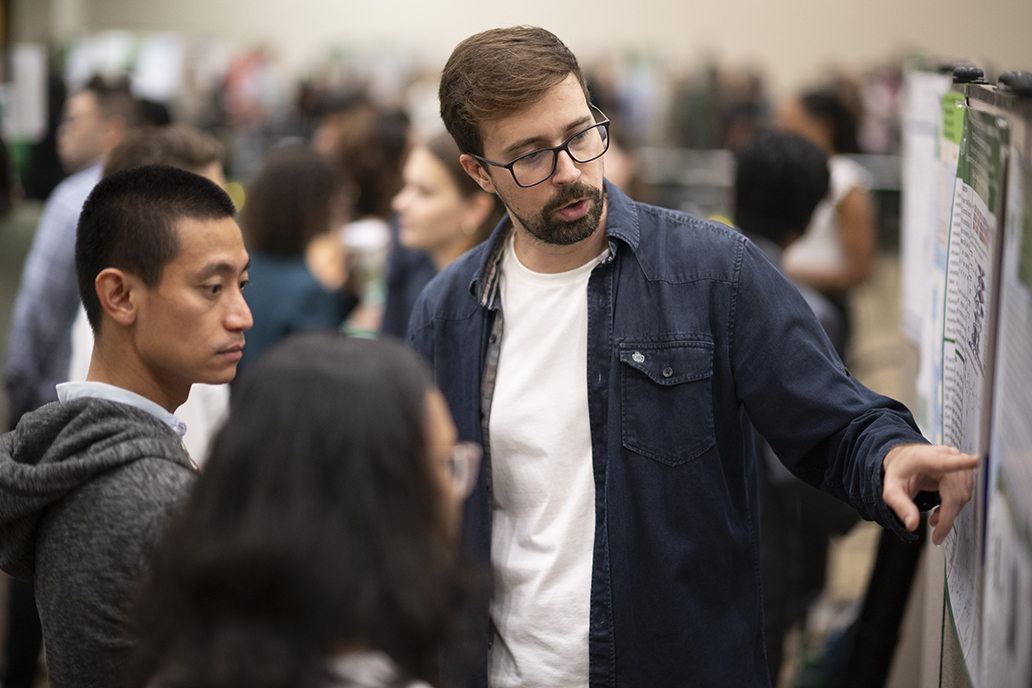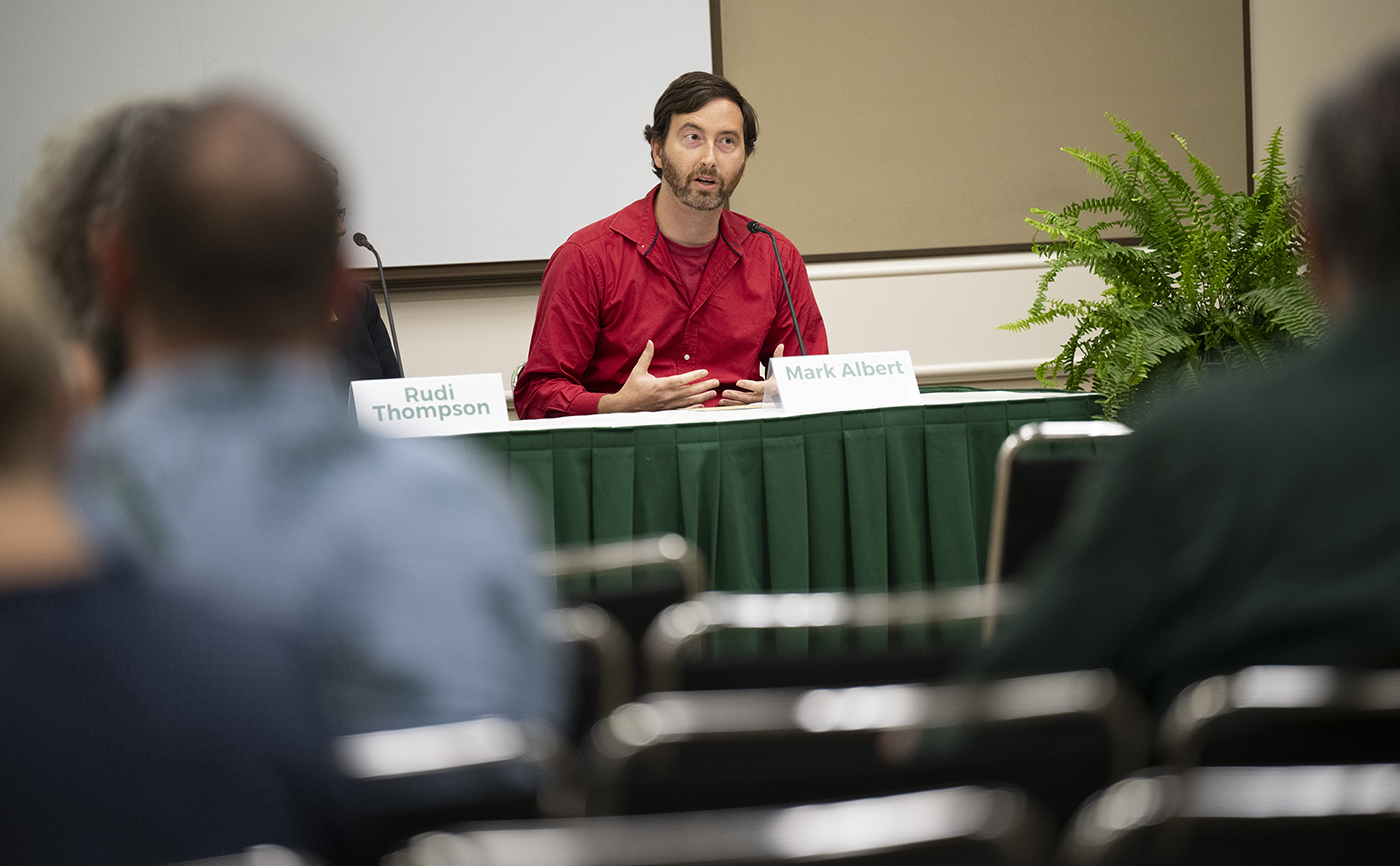
UNT is one of the most comprehensive universities in the North Texas region with a range of disciplines, but one thing unifies everyone, according to Pamela Padilla — research.
“We all support research,” says UNT’s vice president of research and innovation to a bustling morning crowd at UNT’s inaugural University Research Day.
Watch a short recap video of University Research Day
Padilla kicked off the one-day celebration Oct. 5 in the university’s Gateway Center, where more than 130 posters representing an array of faculty and student research projects from all UNT’s colleges filled popup walls in the conference room.
The event, sponsored by UNT’s Division of Research and Innovation, offered an opportunity for faculty, staff, postdoctoral researchers, graduate and undergraduate students to come together to share their research, connect with one another and listen to panel discussions about overarching discoveries and ideas that are shaping the broader research landscape.
During her introduction, Padilla shared some historic news for UNT’s research enterprise. In fiscal year 2023, UNT garnered its highest-ever total of sponsored project awards with more than $86 million in funding from top national agencies such as the U.S. Department of Defense, U.S. Department of Education, National Institutes of Health and National Science Foundation.
“That’s because of all the work that faculty have done, all of the experiments that people have done on this campus and all of the ideas [you’ve had]. We’re a very creative campus. And taking the time and having the initiative to go out and talk to these sponsor agencies. I applaud everyone for that,” Padilla says.
Celebrating Student Scholars
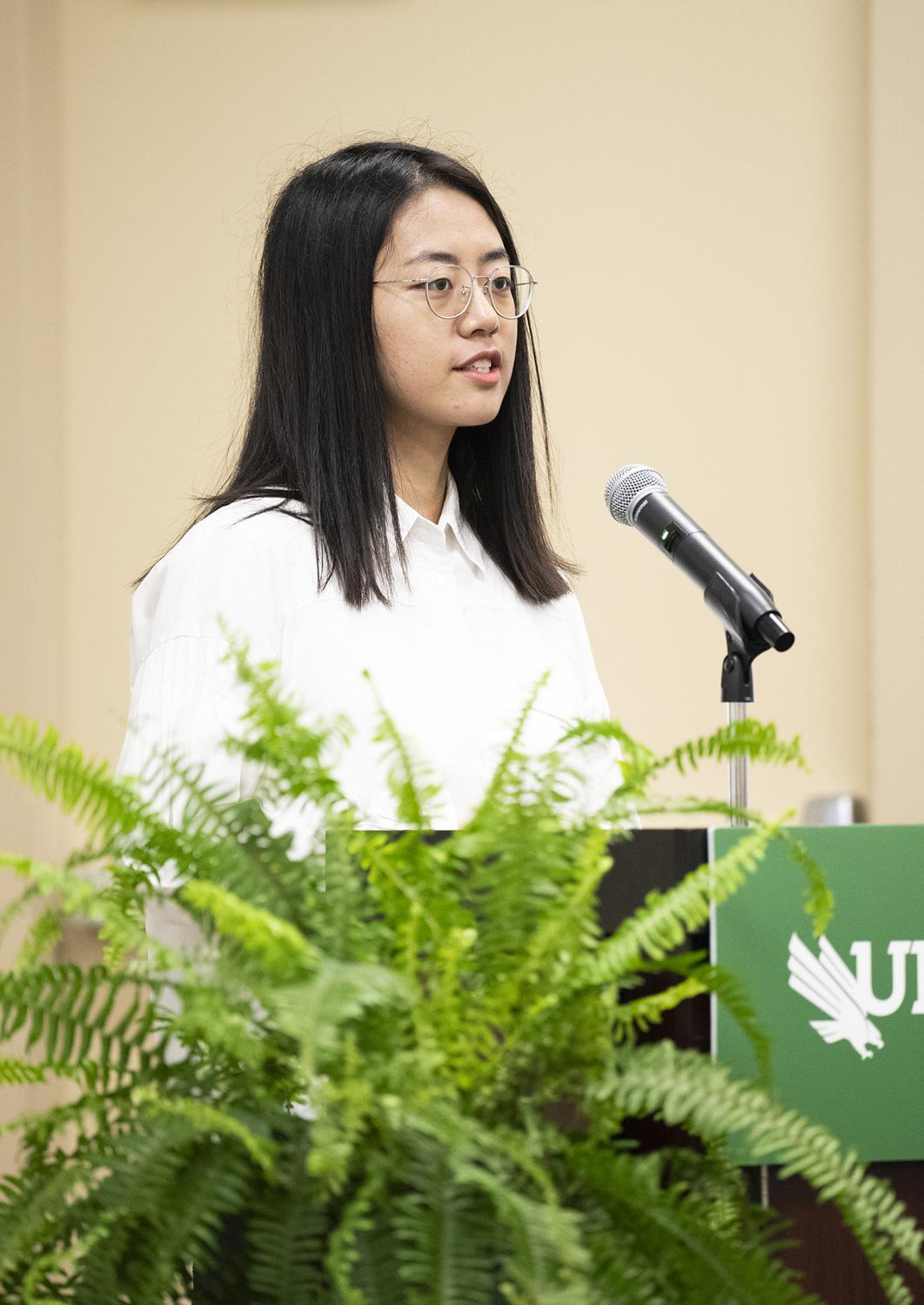
Following the morning poster and networking session which included research from nearly 100 students, attendees traveled down the hall for the first panel session of the day featuring four students giving lightning talks about their research, each followed by brief Q&As.
First up was Liyu Yang, a doctoral student in the College of Information, who talked about her work exploring the role that artificial intelligence — specifically ChatGPT — can play in assisting people make travel plans. Her study found that AI didn’t always live up to the expectations users had for it. It also showed that participants using AI experienced a range of emotions — from happiness and surprise to irritation and disappointment — based on their familiarity with the technology.
Sarah Velez, a biomedical engineering graduate student, shared about how, as part of assistant professor Huaxiao “Adam” Yang’s lab, she’s modeling hypertrophic cardiomyopathy, a condition that affects the left ventricle of the human heart, by mechanically stretching engineered cardiomyocyte cells that are responsible for the heart’s contractions.
“Overall, we showed that this stretcher can induce this mechanical strain and it can translate to what an actual heart does,” she says.
College of Science student Tyler Armstrong, who works in professor Amie Lund’s lab, is studying the impact of inhalation exposure to traffic-generated air pollution, including renin-angiotensin system dysregulation and increased factors associated with Alzheimer’s disease.
“We see that in areas of high air pollution, there is a higher incidence of Alzheimer’s. So, what our lab aims to do is to look at this in a more isolated setting and just tease out some of the mechanisms that are leading to this,” he says.
Lastly, Setareh Dehghani-Moslemi, a behavioral analysis doctoral student from the College of Health and Public Service, discussed her work to understand whether caregivers can learn to use positive reinforcement techniques with their children with autism by listening to podcasts.
“Positive reinforcement plays an important role in changing behaviors, so caregivers can benefit by using it to teach beneficial skills to their children with autism,” she says.
Building Responsible Global Collaboration in Research
Aaron Roberts, associate vice president of research and innovation, set the tone for the next session: “Collaboration is the fuel in research… there’s a lot going on around the world, and navigating those challenges is complex.”
At UNT, there’s a team of staff members who help support faculty and student researchers as they establish relationships with researchers abroad and travel around the world for their work.
When considering work with international collaborators, the panelists had a key piece of advice: engage them early.
“The earlier you can reach out to the research office and find out who you need to talk to depending on where you’re going and who you’re collaborating with, the better,” says Kent Chapman, Regents Professor and director of UNT’s BioDiscovery Institute.
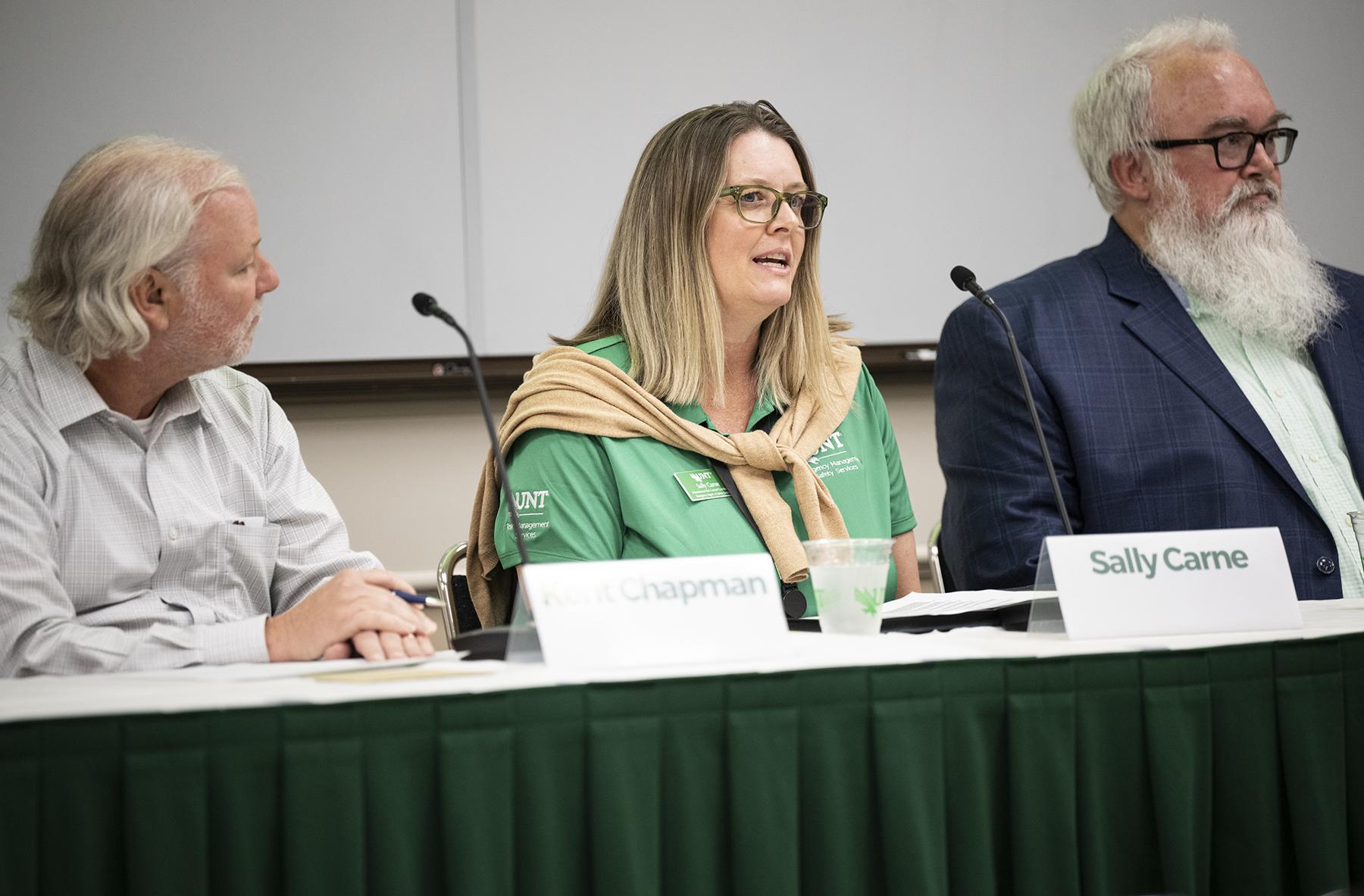
As International Risk Control Coordinator, Sally Carne vets all UNT international travel for research and ensures locations are safe. She also provides researchers with pertinent information about the environments they are stepping into. Once the location is approved, her work doesn’t stop. She continues to monitor the location for safety during the research trip and sometimes for a period after the UNT community member has returned.
Tina Sikes and Patrick McLeod, who safeguard UNT-owned tech used in research abroad, both stressed the importance of thinking about the technology and reaching out to help them understand government regulations in individual countries which may differ from the U.S.
“Technology requirements are only going to get bigger,” says Sikes, director of IT governance, risk and compliance. “They’re only going to become more complex and more detailed, especially with global collaboration. It can be something that can seem daunting, but when you approach it early and you work with your collaborators [at UNT] … it’s a lot easier to navigate.”
Though international research can be complicated, Chapman stressed the reward is worth it.
“I can do more with someone else than what I can do by myself,” he says. “I’ve often found collaborations to be a central driver of my research.”
Better Research Together
Those collaborations are just as important to establish abroad as within the immediate university community.
Discussions in the “Better Research Together” panel moderated by Brenda Barrio, assistant vice president for research and innovation, provided key insights into developing research collaborations. One recurring theme echoed by each presenter throughout the session was the importance of understanding and acknowledging blind spots in one’s knowledge and skill set.
“You can’t figure that out in a silo,” sociology associate professor Buddy Scarborough says. “The key to it is being part of different communities that deal with topics that are outside of your standpoint."
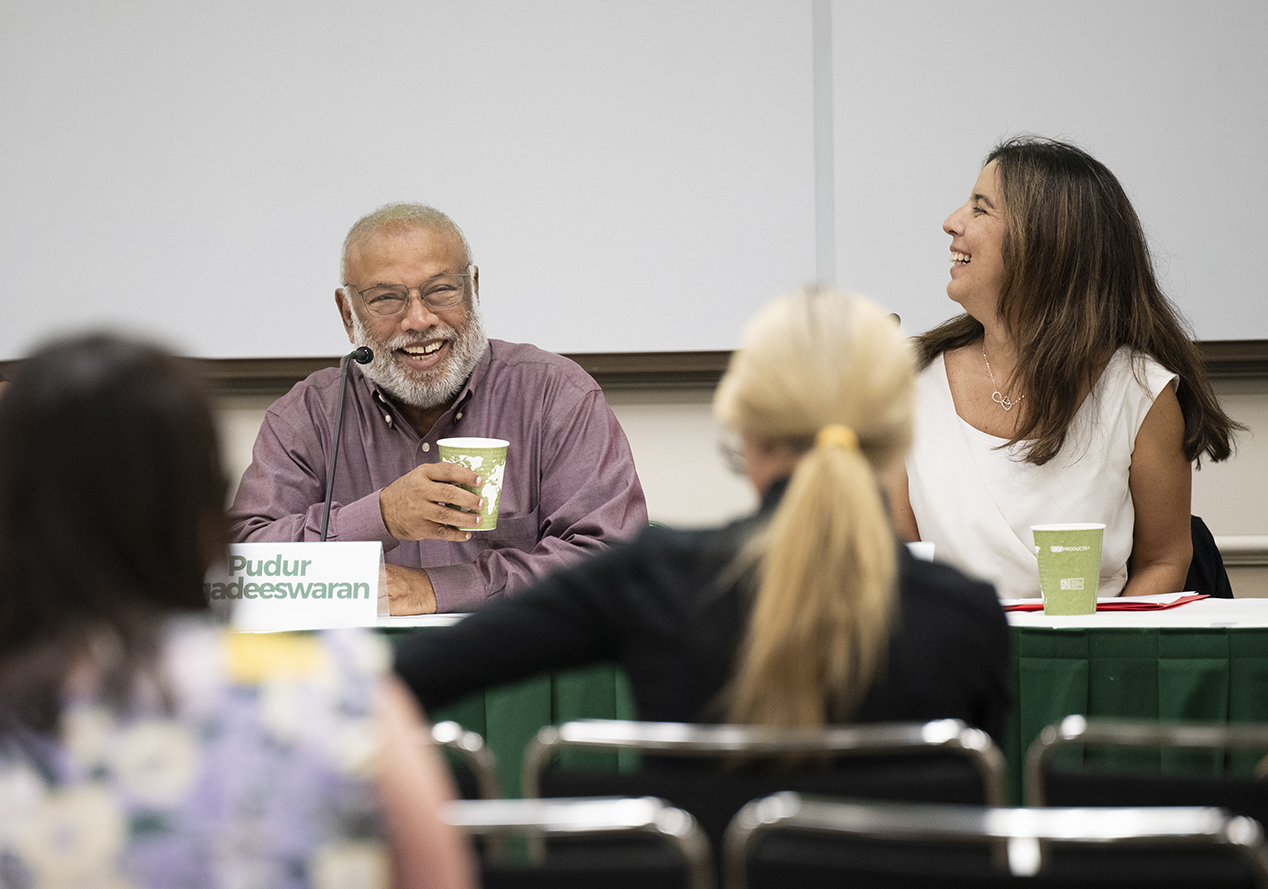 Other panelists agreed that interdisciplinary collaborations are crucial to discovery.
Pudur Jagadeeswaran, professor of medical genetics in the College of Science, pointed
to the collaboration between Hungarian biochemist Katalin Karikó and American immunologist
Drew Weissman, who jointly received the 2023 Nobel Prize in Physiology for their contributions
to the development of the mRNA COVID-19 vaccine.
Other panelists agreed that interdisciplinary collaborations are crucial to discovery.
Pudur Jagadeeswaran, professor of medical genetics in the College of Science, pointed
to the collaboration between Hungarian biochemist Katalin Karikó and American immunologist
Drew Weissman, who jointly received the 2023 Nobel Prize in Physiology for their contributions
to the development of the mRNA COVID-19 vaccine.
Through its research institutes and emerging research centers, UNT already has created some structured ways to nurture interdisciplinary thought. All panelists suggested a way to build on that success and cultivate relationship building is offering up more ways for information sharing between disciplines, perhaps through formal research talks and other events that invite informal scholarly discussion of ideas.
While faculty collaboration is important, the panel also stressed that giving students interdisciplinary research opportunities is just as critical.
“Asking them to come to seminars, finding ways for them to think about how questions can cross boundaries…that’s a really great opportunity to train the next generation of interdisciplinary scholars,” says Lauren Fischer, assistant professor in the Department of Public Administration.
Ultimately, the panel concluded that clear and open communication is necessary for effective collaboration in research. Peggy Ceballos, professor in the Department of Counseling and Higher Education, advised that creating agendas and cementing participants’ roles gives collaborators the freedom to dive more deeply into their work.
Exploring the Role of AI in Research
The final panel of the day explored the hot topic of AI and its role in research. Multiple disciplines were represented such as biomedical engineering, studio art and business.
All of the panelists shared how they already use AI in their professional work. Song Fu, a professor in the computer science and engineering department, said he uses ChatGPT to help revise graduate students’ papers. Mark Albert in biomedical engineering uses the technology in his research to comb through medical records to track patient data during recovery.

Christopher Meerdo, an assistant professor in the Department of Studio Art, has long used AI in his creative work and is teaching a topics course this semester that explores the use of AI in artistic practices. He encourages his students to experiment with AI on projects so they can better understand it. Information systems professor Anna Sidorova in the G. Brint Ryan College of Business said she likes her students to experiment with AI to see how their chosen profession can still be relevant as AI technology advances.
As UNT’s assistant vice president for digital strategy and innovation, AI is top of mind for Rudi Thompson. She’s working to help faculty best harness the technology and better understand its role in higher education now and in the future.
UNT is one of a select group of universities nationwide taking part in a two-year research project, Making AI Generative for Higher Education, that’s sponsored by the nonprofit Ithaka S+R.
The panel evolved into a discussion over the ethical use of AI by researchers, professionals and students. The five came to an agreement on one key point.
“One of our roles as a university is to teach our students ethics,” Thompson says. “If we don’t teach them how to ethically use AI now, how will they know when they graduate and join the professional world?”
Amanda Lyons, Heather Noel, Lisa Sciortino and Bess Whitby contributed to this story.
